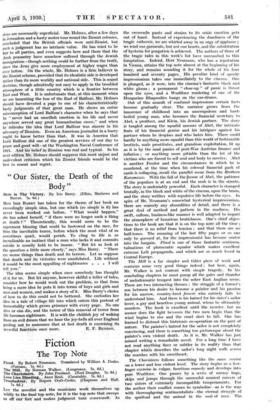" Our Sister, the Death of the Body"
Miss IRIS BARRY has taken for the theme of her book an exceedingly simple idea, but one which (so simple- is it) has never been worked out before. " What would happen," she has asked herself, " if there were no longer such a thing as death ? " Theoretically, this would seem to be the supremest blessing that could be bestowed on the race, for thus the inevitable terror, before which the most vital of us sometimes quail, would perish. To cling to life is so ineradicable an instinct that a man who lacks it and commits suicide is usually held to be insane. " But let us look at the question a little more closely," says Miss Barry. " There arc worse things than death and its terrors. Let us suppose that death and its victories were -annihilated. Life without it would be the most appalling of nightmares 6 . 6 I will tell you."
The idea seems simple when once somebody has thought of it for us. But let anyone, however skilful a teller of tales, consider how he would work out the problem, so that from being a mere idea he puts it into terms of boys and girls and men and women, and makes a story of it. Miss Barry's choice of how to do this could not be bettered. She embodies her idea in a tale of village life into which enters this portent of immortality which grows grimmer with every page. No one dies or can die, and the terror of this removal of terror from life becomes nightmare. It is with the childish joy of waking from an evil dream that we hear the joy-bells all over England pealing out to announce that at last death is exercising its










































 Previous page
Previous page